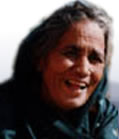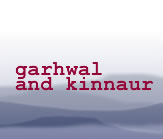 |
 |
||
 |
|||
|
GLOSSARY India glossary |
transcript |
| Section 1 | What is your name and address? I am Krishna Kumari, wife of Ganjavar Negi. I belong to village Nigulsari, Tehsil - Nichar, Dist. Kinnaur. |
Could you tell me something about your customs? They are mainly agriculture, animal rearing, belief in gods and goddesses, educating boys and girls and marrying them off, and celebrating Fulyanch, Dakhlening, Diwali (festival of light) and Veeshu Faguli every year. |
|
How many castes are there? There are mainly Rajputs, Harijan, blacksmiths, Bari and Chanalas in our village. |
|
What are the major occupations / professions? Farming, cattle rearing, poultry, farming, trade business (in some cases), carrying the deities, [carrying the images from the temples before the public is an important function] wool spinning, etc… |
|
How do you travel? If there are trains or buses we use them. If there are no roads, we walk. At times we have to ride a horse to travel long distances. |
|
What are the roads like in this area? In some places they are motorable but mostly they are fit only for walking. |
|
How do you pass your time / spend your life? Our system of working is different. Women mainly milk the cows, take the manure [to the fields], carry loads, turn the soil in the fields, sow vegetables, cook, wash clothes, etc. Whereas the man tills the soil, ploughs the fields, rears sheep and goats, builds houses and collects wood and stones, etc. |
|
How do you make both ends meet? By farming, cattle rearing and selling apples. |
|
Do you feel that the education that is available in Nichar is good? It is the best. |
|
What do you think is proper, living alone or with the family? Living with the family. |
|
| Section 2 | Should one get educated or remain uneducated? Getting an education is right. |
What do you know about old customs and traditions? People in the olden days were honest and truthful. But today they are clever, cunning, and they tell lies. So much so that they also loot the temples, which was unheard of earlier. People were scared to do such things. |
|
Has it been better after Independence or was it better during the British times? Definitely after Independence has been much better. |
|
Which religion do you follow? We follow Hinduism and Buddhism. |
|
What is the difference between your religion and others' religion? There is a lot of difference. We follow only Hinduism or Buddhism, whereas in the western countries they follow other religions. |
|
Which is your main festival? We celebrate mainly Bishu Fulyach. |
|
Was there much sickness in your generation? In earlier times the grown ups very rarely fell sick. But now compared to the younger ones they fall ill very often. |
|
Where did you used to get medicines from? In the olden days people got great relief by worshipping and praying to gods and goddesses, or they called the amji (local doctor) for treatment. He used to prepare medicines out of the locally available herbs and roots. |
|
How were marriages performed in olden days? In the olden days polyandry was very common. |
|
Was giving dowry a common practice? No. It was very rarely given. People hardly collected utensils and other items. Only a few big utensils were given as dowry. Girls were married by sending two people (meaning this was not an elaborate ceremony – she was just accompanied by two members of her own family), generally this was called nyotung, and some girls were forcibly dragged off to be married. (Girls were made to leave house and boys encouraged to “kidnap them”). |
|
Do you worship gods and goddesses? We do, with a lot of mental strength and faith. |
|
Do you visit temples? Yes, especially during festivals. Otherwise, too, we visit temples every morning and evening. |
|
| Section 3 | Do you pray? Yes, we do, as this area has been known as Devbhumi – the land of gods – since the times of our forefathers. |
Was it the numberdar (community head/local revenue officer) of the village who used to solve village disputes? If so, were his decisions just? Yes, he solved all the disputes, but in some cases he was free to use his will and decide as he wished. |
|
Do you approve of the government's electrification programs in your region? Yes, this program has reached almost all the parts of our region. I think it is very useful. |
|
I feel that you, Krishna Deviji, must be quite tired by now. May I request you to sing your favourite song? If you say, so, I shall sing for you: [Sings] (1) On the banks of the river Sutlej - the zamindar (landowner) of the Thagar family lived with his two daughters. Both the girls went on the terrace of their house and were telling tales of their happy and unhappy experiences. (2) The Rinbodhis came up to upper Kinnanur. They came in a motor car. They reached the Tabo ground where they expressed themselves (their thoughts) in front of a large audience. |
|
Have you heard of a thing called fertiliser? I have no idea whether it's the name of an animal or a human being. |
|
Don't you know about chemical fertilisers and their use? Now I understand. We have the manure of cow dung, or we get it from goats and sheep. |
|
What I am referring to is the manure that comes in bags, given by the government. Do you use it in fields? I have no idea about it, nor have I ever bought it. But I have seen some people buying it from the government depots at half rate. Their yield is better but the soil becomes very hard and it's not considered very good. I always use cow dung as manure in my fields and for other plants. This helps to give better produce and maintains the softness of the soil. Cow dung is the best type of manure. |
|
How big is your orchard? I have a small one near the road where there are apple, apricot and chuli (wild apricot) trees, the number of the trees is about 160. During apple blossom time if the weather is bad it is all damaged. So the produce decreases. We have to spend a lot for spraying insecticides whereas the income is comparatively lower. We do get good returns if the weather remains favourable. I have planted a green olive to please nature and keep the evil eye away. |
|
| Section 4 | Which are your favourite foods? Do tell me about them. Oh - nobody has ever asked me this. This is a very good question. I am very fond of eating chul funting (a traditional dish) of chulu (wild apricot) and chaulai (amaranth) I feel very active. It's very good for digestion. In olden times we treated 1/3 of the diseases by having this mixture. The second favourite of mine is having dou (dumpling) with butter and ghee (clarified butter). |
What is the difference between honey bees and other bees? All bees are alike. Are you talking of the bees that sting or the honey bees? |
|
I mean the good / useful bees and the bees that carry germs of various diseases? Now I understand. I have six or seven beehives but they are of local quality. Every year the bees live in the hives and I get honey which I distribute to all. This is used for various medicines. The other bees are destroyed by spraying insecticides. |
|
Do you have any knowledge about the people suffering from goitre, paralysis and those who are deaf? Earlier I used to see people with goitre or polio or deaf people. But with the increase of education, they keep consulting experts to check all these problems. Nowadays we do not see many such diseased people. |
|
What are the means of irrigation here? Neither in my village nor in the whole of the panchayat (village council) area is there any irrigation facility. We depend on rains as we did earlier. These days the government is paying special attention to providing drinking water and water for irrigation purposes. Their scheme has already been started in the village. I am sure that irrigation facilities will be available in future. |
|
What do you do the entire year round? For six months we are busy doing farming and we spend the remaining six months in doing some sort of labour, going from one place to another, from one region to another area, learning about how other people live, about their customs and traditions and the new techniques to improve farm methods. |
|
What are the means of transportation in this area? The roads are bad since it’s all hilly. There is only one state highway in the entire region, for vehicles to use. People generally walk to the distant areas. The road construction work has just been started. It's going to take a very long time. People carry heavy loads on their back. Roads are badly needed. |